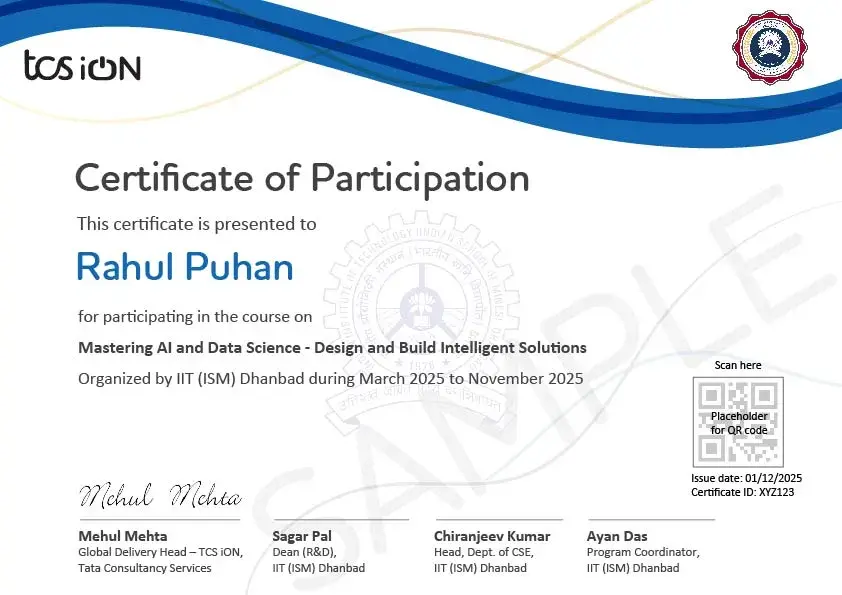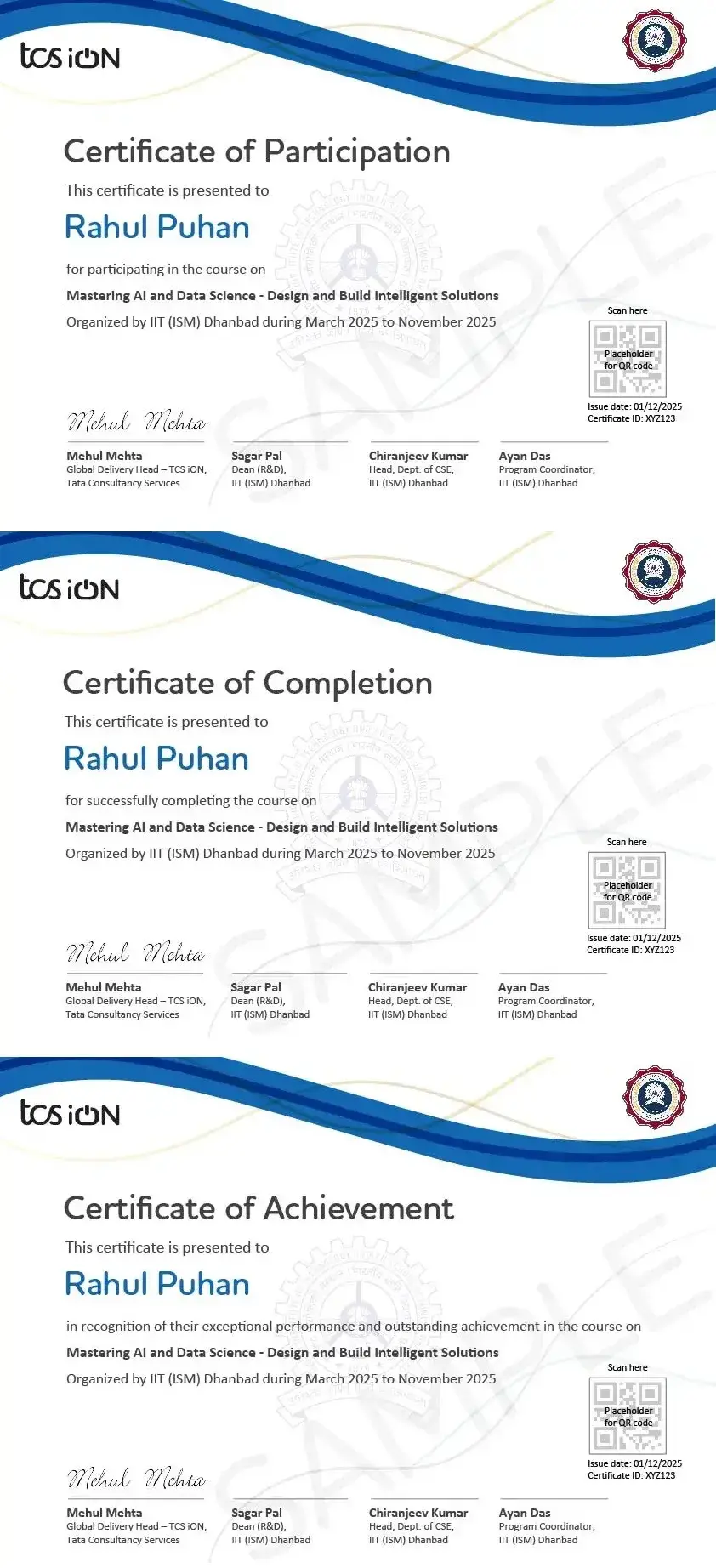 IIT (ISM) Dhanbad
IIT (ISM) Dhanbad
About the programme
This is a 9-month certification programme in Artificial Intelligence (AI) and Emerging Technologies that offers a dynamic pathway to career advancement and professional success across three domains - Data Analytics Modeling and Visualization, Natural Language Processing (NLP) and Computer Vision. In an era defined by data-driven decision-making and technological innovations, the demand for skilled AI practitioners is at an all-time high. Individuals will gain the expertise needed to harness the power of data, develop predictive models and unlock actionable insights that drive business growth and innovation by investing in this programme. Through this certification course, candidates will get the opportunity to learn from IIT professors and leading industry experts in the domain.
Read More...Explore AI and Emerging Technologies Specialisation Paths

Mastering AI and Data Science - Design and Build Intelligent Solutions

Mastering AI and Natural Language Processing - Design and Build Intelligent Solutions

Mastering AI and Computer Vision - Design and Build Intelligent Solutions
Click Here to know more details about the comprehensive syllabus
Campus Immersion Programme

The campus immersion programme is OPTIONAL and is planned across 3 to 5 days at the IIT (ISM) Dhanbad campus. The cost of this campus immersion programme will be around ₹ 5K - ₹ 7K, which will be borne by the learners. During this period the institution takes responsibility for covering expenses related to accommodation and meals.
The campus immersion will include curated immersive experiences, academic sessions, hands-on learning, workshops and face-to-face engagements. By facilitating such arrangements, the institution aims to create an environment

Key highlights
200 hours of overall experiential learning for each Specialisation Path
2 Add-on prep courses on Python Programming and Statistics Essentials
3 to 5 day inspiring, enriching immersion at the IIT (ISM) Dhanbad campus
Continuous end-of-module assessments
Live lectures for interactive learning and doubt clearing
Dedicated hands-on lab sessions by IIT (ISM) Dhanbad faculty
Industry projects and use cases
Interact with industry experts from TCS and beyond
The participants are expected to have developed the following skills by the end of the programme:
-
Understand Mathematical principles will help to grasp concepts and effectively apply algorithms and techniques
-
Develop sophisticated models capable of handling complex tasks such as image recognition, natural language processing, and more
-
Master extraction of actionable insights from data, driving informed decision-making and strategic planning
-
Understand and interpret human language, enabling applications such as sentiment analysis, machine translation, chatbots, and information retrieval
-
Understand and interpret visual information from images and videos, leading to applications such as object detection, image classification, facial recognition, and autonomous driving
-
Develop systems and applications that enhance user experiences through image and video analysis, leading to improved efficiency, safety, and decision-making
-
Provide learners with advanced skills in AI and Data Science, enabling them to stay competitive in the rapidly evolving technological landscape
-
Empower learners to tackle complex problems using AI and Data Science techniques, leading to innovative solutions and improved decision-making
-
Provide learners with multiple facets of data handling, from analytics to visualization, providing a well-rounded skill set suitable for various data-centric roles.
-
Equip learners with tools allow individuals to extract actionable insights from data, driving informed decision-making and strategic planning
Learning Outcomes

Develop hands-on expertise in
Python
Keras
Google Colaboratory
TensorFlow
Jupyter Notebook
NumPy
Scikit-learn
PyTorch
Pandas
Natural Language Toolkit (NLTK)
TextBlob
OpenCV
TorchVision
Potential Career Path
The field generates a variety of job roles, including but not limited to based on the following specialisation tracks:
Data Science
-
Data Scientist
-
Data Engineer
-
Data Analyst
-
Data Architect
Natural Language Processing (NLP)
-
NLP Engineer
-
NLP Analyst
-
Machine Learning Engineer
-
Conversational AI Developer
Computer Vision
-
Computer Vision Analyst
-
Machine Vision Engineer
-
AR/VR/XR Developer
-
Image Processing Engineer
Certificate programme recommended for
Freshers/individuals pursuing Bachelor's/Master's degree, aspiring for a career in the field of Data Analytics, NLP and Computer Vision. Junior and mid-career professionals looking for an accelerated career growth and salary hike
Individuals interested to pursue research in the field of AI and Data Science to gain foundational understanding and apply domain knowledge to run start-ups
Individuals with basic programming knowledge (Python), foundational understanding of Mathematics, Algebra, Calculus, Probability and Statistics
Access to 2 Add-on prep courses on Python Programming and Statistics Essentials to help in the learning journey
Programme pedagogy
Expert-led live sessions
Engage in dynamic training sessions conducted by distinguished faculty from IIT Dhanbad along with seasoned industry professionals.
Recorded session videos
Access educational content on-demand, available for learning on any device, at any time, ensuring flexibility and convenience for revisiting the material.
Industry use cases
Get real-world experience and enhance your understanding of complex business situations through use cases.
Peer networking and expert connect
Expand your professional network and engage with experts through our interactive community platforms, facilitating enhanced learning and problem-solving.
Hands-on learning experiences
Participate in practical sessions where you will work with real-world data and public datasets, fostering a deep, experiential understanding of the material.
Live doubt solving sessions
Address your queries in real-time with direct access to experts during live sessions, ensuring clarity and immediate assistance.
Dedicated learning management team
Receive continual guidance and support from our committed learning management team, tailored to meet your educational needs and enhance your learning journey.
Programme Syllabus Overview
Download Programme CalendarThis comprehensive syllabus covering the latest industry practices and techniques on AI and Data Science is structured into four modules as per the chosen specialisation path which spans across 9 months with optional campus immersion. This course curriculum is designed in a way that it aligns with the current industry trends and practices, making graduates job-ready and valuable to organisations. In addition, guiding the learners through the intricacies of the concepts with hands-on implementations on case studies and scenarios as per the industry standards. Each module provides a solid foundation in building proficiency by ensuring a cohesive and thorough understanding from the basic to the advanced topics leveraging extensive hands-on implementations.
- Basic Statistics: Part 1 - Statistical Data Representation, Central Tendency, Dispersion, Statistical Moments Correlation
- Basic Statistics: Part 2 - Correlation, Linear Regression
- Probability Theory, Probability distribution
- Sampling Theory and Distributions - I
- Sampling Theory and Distribution - II
- Theory of Estimation
- Lab on Sampling, Estimation and Hypothesis Testing TCS
- Linear Algebra - I: Determinant, Matrix, Vector Space Linear Transformation, Eigenvalues, Eigenvectors
- Linear Algebra - II: Matrix Operations and Decompositions, SVD, ICA
- Dimensionality Reduction
- Logistic/Kernel/Lasso Regression and Regularization
- Time Series Analysis
- Non-parametric Methods
- Optimisation Techniques
- Introduction to Bayesian Statistics
- Laboratory session on topics in session 11, 12
- Heuristic Search
- Adversarial Search
- Constraint Satisfaction
- Genetic Algorithms and multi-objective search
- Building Logic Program
- Logic Program writing using PROLOG Programming/Python Programming (LAB)
- Probabilistic Reasoning
- Machine Learning (Basic Concepts)
- Supervised Learning
- Classification methods using scikit-learn (Hands-on Session) (LAB)
- Unsupervised Learning
- Reinforcement Learning
- Basics of Neural Networks
- Multi-layer Perceptron (MLP)
- Training Neural Networks using Keras (LAB)
- Using Tensor Flow for implementing Regression and Clustering methods (LAB)
- Ensemble Learning
- Project - Implementation of AI/ML using a Business Case
- Introduction to Deep Learning
- Training Deep Neural Network (LAB)
- Basic Concepts of Convolutional Neural Network (CNN)
- Implementing CNNs using TensorFlow and PyTorch (LAB)
- CNN Interpretation/Visualization using the popular architectures (LAB)
- Recurrent Neural Network (RNN) and its variants, Sequence-to-Sequence Models
- RNN applications (PoS tagging) and implementation of Sequence-to-Sequence Learning using PyTorch (Machine Translation) (LAB)
- Transformers and self-attention
- Implementing Variational Autoencoder with Keras (LAB)
- Variational Autoencoders (VAE) and Generative Adversarial Networks (GAN)
- GAN Implementation using PyTorch (LAB)
- Graph Embedding and Graph Neural Network (GNN)
- Implementing GNN using PyTorch (LAB)
- Project - Implementation of Deep Learning using a Business Case (2+8 hours)
- Introduction to Data Analytics
- Basic Data Manipulation using Python or R (LAB)
- Fundamentals of Statistics for Data Analytics
- Statistical Analysis using Python or R Libraries (LAB)
- Cloud Computing Alliance
- Setting up a Virtual Machine on a Cloud Platform (LAB)
- Data Storage and Management on the Cloud
- Setting up a Database on a Cloud platform (LAB)
- Data Modeling with Cloud Databases
- Data Modeling and Processing (LAB)
- Data Visualization Techniques
- Visualizations using a Visualization Tool (LAB)
- Data Analytics and Visualization Case Studies
- Advanced Data Visualization and Dashboarding
- Analyzing and Visualizing Real-world Datasets (LAB)
- Cloud-based Data Analytics
- Introduction to Natural Language Processing (NLP)
- Word Embeddings (Word2Vec, GloVe, fastText)
- Language modeling, PoS tagging, and Named Entity Recognition
- Introduction to NLTK library (LAB)
- Develop language model, PoS tagger, and NER using PyTorch (LAB)
- Syntactic and Semantic Parsing
- Sentiment Analysis using PyTorch library and word embeddings
- Information Extraction, Word Sense Disambiguation
- Summarization Theory and lab using T5 library and PyTorch
- Transformer-based LLMs - BERT, XLM-RoBERTa
- MT using transformer-based Sequence-to-Sequence Models (LAB)
- Question Answering And Dialog Systems
- Question Answering And Dialog Systems Lab
- Cross-lingual NLP, Domain Adaptation and Transfer Learning
- Prompt Engineering
- Prompt Engineering Lab
- Project - Implementation of DM&V using a Business Case (2+8 hours)
- Introduction to Computer Vision
- Image Processing Basics
- Image Segmentation
- Feature Extraction, Measurement and Matching
- Image Processing Tools and Techniques (LAB)
- CNNs for Image Classification
- Object Detection
- Object and Motion Tracking
- Structure from Depth and Motion
- Instance and Semantic Segmentation
- Face Detection and Recognition
- Image Reconstruction
- Generative Adversarial Networks (GANs) for Image Analysis
- Feature Matching and Object Detection (LAB)
- Face Detection and Recognition (LAB)
- Motion and Tracking (LAB)
- Project - Implementation of Object Recognition and Image Analysis using a Business Case (2+8 hours)
Certificate Eligibility Criteria
- Learners will be awarded a co-branded certificate upon successful completion of the programme. The course evaluation components are modular quiz, assignment and attendance.
- Certificate of Participation (CoP): If a learner has scored less than 40% in the course evaluation criteria and live lecture attendance is less than 50%, then a CoP will be awarded.
- Certificate of Completion (CoC): If a learner has scored within the range of 40% to 70% in the course evaluation criteria and has atleast 50% live lecture attendance, then a CoC will be awarded.
- Certificate of Achievement (CoA): If a learner has scored greater than 70% in the course evaluation criteria and has atleast 50% live lecture attendance, then a CoA will be awarded.

Meet the Mentor(s)

Dr. Sushanta Mukhopadhyay completed his B.Sc. degree (Hons.) in Physics from Presidency College, Kolkata, in 1988, and B.Tech and M.Tech degrees in Radiophysics and Electronics from the University of Calcutta, in 1992 and 1994, respectively. He has completed his PhD in Image Processing from the Indian Statistical Institute, Kolkata, in 2003. From 2001 to 2003 and from 2004 to 2007, he was with Sanford Burnham Prebys Medical Discovery Institute, La Jolla, CA, USA, as a Postdoctoral Researcher and with Nanyang Technological University, Singapore, as a Research Fellow, respectively. He is currently an Associate Professor with the Department of Computer Science and Engineering, IIT Dhanbad (erstwhile Indian School of Mines), Dhanbad, India. He has published articles in internationally reputed journals, such as the IEEE Transactions On Image Processing, the IEEE Transactions On Circuits And Systems II: Express Briefs, Pattern Recognition, and Signal Processing. His research interest includes image and video processing.
Read More...
Dr. Chiranjeev Kumar has been working as an Professor in the Department of Computer Science and Engineering at IIT (ISM), Dhanbad, India. He has received his PhD degree from Allahabad University in 2006. He was the Gold Medalist of his M.E. batch at MNNIT, Allahabad, India in 2001. In 1998, he was certified as a Certified Novell Administrator (CNA) and Certified Novell Engineer (CNE). In his 14 years of teaching and research career, he has contributed 42 research papers in several refereed journals and conference proceedings of National and International reputes. His main research interests include Mobility Management in Wireless Networks, Ad Hoc Networks, and Software Engineering. He is an IEEE member since 2006.
Read More...
Dr. Dharavath Ramesh is an Associate Professor in the Department of Computer Science and Engineering at the Indian Institute of Technology Dhanbad. He has received his PhD from the Indian Institute of Technology (Indian School of Mines), Dhanbad under the supervision of Professor Chiranjeev Kumar. He completed his M.Tech in Computer Science and Engineering with specialisation in Software Engineering from Jawaharlal Nehru Technological University, Hyderabad. He has earned his B.Tech in Computer Science and Engineering from Kakatiya Institute of Technology and Science (KITS), Warangal. Dr. Ramesh’s research interests include Blockchain and Distributed Computing, Distributed Databases, Cloud Storage And Security, Modeling Big Data, Processing Big Data, Virtualization and Scheduling in Cloud Environment, Load Balancing Approaches, Deep Learning Strategies, Brain Computer Interaction, Community Detection In Social Networks, and Ml Paradigms in Agriculture. He has published over a hundred technical papers in refereed journals and conference proceedings. He has served in various capacities for journals and conferences. He was the organising Co-Chair for RAIT 2018, RAIT 2014, and an advisory committee member of various international and national conferences/workshops/symposiums. He has served on the programme committees of various conferences including Bangalore Development Authority (BDA), International Conference on Distributed Computing and Internet Technology (ICDCIT), Advanced Computing Network and Security (ADCONS), Recent Advances in Information Technology (RAIT), and International Council for Open and Distance Education (ICDE). He is a senior member of the Institute of Electrical and Electronics Engineers (IEEE) and a professional member of Association for Computing Machinery (ACM).
Read More...
Dr. Sachin Tripathi holds a B.Tech degree in Computer Science Engineering (CSE) from Kanpur University, India. He completed his M.Tech and PhD in Computer Science and Engineering from the esteemed Indian Institute of Technology (ISM), Dhanbad, India. Currently, he serves as an Associate Professor and also holds the position of Head of the Department of CSE Department at the Indian Institute of Technology (ISM), Dhanbad, India. With over eighteen years of experience in teaching Computer Science subjects, he specialises in Artificial Intelligence. Throughout his career, he has made significant contributions to the field of research and has authored more than 100 research papers, which have been published in prestigious journals like IEEE Transactions on Industrial Informatics, IEEE Transactions on Wireless Communications, IEEE Transactions on Instrumentation and Measurement, and Applied Soft Computing, among others. Additionally, he has authored a book titled "Enhancements on Internet Applications: Multicast, Secure E-Mail Messaging, and E-Business". He also holds the position of an Associate Editor at "International Journal of Communication Systems," published by Wiley. His research interests primarily revolve around Artificial Intelligence, Network Security, Ad-hoc and Sensor Networks.
Read More...
Dr. Tarachand Amgoth has completed his B.Tech degree in Computer Science and Engineering from the Jawaharlal Nehru Technological University (JNTU), Hyderabad in 2002, M.Tech degree in Computer Science Engineering from the National Institute of Technology (NIT), Rourkela in 2006, and PhD from the Indian Institute of Technology (Indian School of Mines), Dhanbad in 2015. Presently, he is an Associate Professor in the Department of Computer Science and Engineering, IIT (ISM), Dhanbad. His current research interests include Wireless Sensor Networks (WSNs), Cloud Computing, Fog/Edge Computing, Serverless Computing and Internet of Things (IoT). He has contributed more than 50 publications in reputed international journals and conferences. Currently, he is working on a project titled “Interoperability Issues in Fog-Cloud Infrastructure for IoT Applications", sponsored by the Department of Science and Technology (DST), Science and Engineering Research Board (SERB), Government of India. He has published several journals on IoT and Cloud Computing. He has 15 years of teaching experience and has taught courses on Internet of Things and Cloud Computing to B.Tech and M.Tech students.
Read More...
Dr. Ayan Das is an Assistant Professor in the Department of Computer Science and Engineering at IIT (ISM) Dhanbad. He has received his PhD from IIT Kharagpur. He has completed his M.Tech and B.Tech degrees in Computer Science and Engineering from IIT Kharagpur and NIT Durgapur, respectively. His research interests include Natural Language Processing, Machine Learning, and Information Retrieval. Before joining IIT (ISM), he has worked as a Systems Engineer at TCS for 3 years from 2008 to 2011, and as an Assistant Professor in the Department of Computer Science and Information Systems at BITS Pilani (Hyderabad campus) from December 2020 to 2021. Currently, he has 16 publications in reputed conferences and journals.
Read More...
Dr. Saurabh Srivastava has over 7 years of experience in industry and academia with roles spanning across development, planning and architecture of IT solutions. The responsibilities assigned to him include teaching assignments, administrative duties and hands-on product development. He has worked in organisations with varying profiles, including the prestigious space agency of India, ISRO. His area of expertise includes Software Architecture and Engineering as well as AI-intensive Systems. He is passionate about planning and building Software Systems to automate business processes. He holds a Doctorate and Master’s degree in Engineering from the Department of CSE, IIT Kanpur. During his master’s, he was the Top Ranker in his Department, for which he received the Academic Excellence Award from the Institute. He is currently serving as an Assistant Professor at the Department of Computer Science and Engineering at IIT (ISM) Dhanbad, with functional positions of Faculty-In-Charge, Automation of the Institute and Co-Faculty In-charge, Data and Software Technology Club under the Naresh Vashisht Centre for Tinkering and Innovation. He is also a member of the Executive Committee of TEXMiN Foundation, a Technology Innovation Hub set up by the Department of Science and Technology, Government of India.
Read More...
Dr. Mauajama Firdaus currently works as an Assistant Professor in the Department of Computer Science and Engineering at IIT(ISM) Dhanbad. Previously, she was a Postdoctoral Researcher in the Department of Computing Science at the University of Alberta, Canada. She has earned her PhD from the Indian Institute of Technology Patna, India, in 2021. Her primary research focus lies within the domains of Natural Language Processing and Dialogue Generation. Over the past seven years, she has dedicated her research efforts to Natural Language Processing (NLP), Information Extraction, and Machine Learning (ML), yielding substantial contributions in these fields. Dr. Firdaus has authored numerous papers presented at esteemed conferences such as AAAI, IJCAI, ACL, EMNLP, COLING, NAACL, and published in distinguished journals including Expert Systems with Applications, Knowledge-based Systems, ACM Transactions, IEEE Transactions on Affective Computing, among others. Notably, she has delivered tutorials at IJCAI, ECIR, COLING, premier conferences, specifically on the topic of empathetic dialogue systems.
Read More...
Dr. Haider Banka joined the Department of Computer Science and Engineering, IIT(ISM) Dhanbad as an Associate Professor in the year 2007 and is currently working as an Associate Professor in the same Department since 2013. He has worked as a visiting Assistant Professor in the Center for Soft Computing Research, Indian Statistical Institute, Kolkata for three months. He has also worked as a visiting Research Associate in the Department of Computer and Information Science (DISI), University of Genoa, Italy, for three months in the year of 2006. He was a Senior Research Fellow at Machine Intelligence Unit, Indian Statistical Institute, Kolkata, for 2 years from April 2004 to March 2006. He has taught many subjects such as Soft Computing, Data Mining, Algorithms and Graph Theory, Operating Systems, Data Structures, C Programming and others. His current research interests includes Machine Learning, Soft Computing Applications, and Optimizations. Dr. Banka has published more than 100 peer reviewed journals and conferences and has awarded 12 PhD degrees under his supervision. In addition, Dr. Banka has published two authored books and two IEEE conference proceedings. Dr. H. Banka is a reviewer of many international journals and conferences including IEEE Transactions on Systems, Man, and Cybernetics, Expert Systems and Applications, Pattern Recognition, Information Sciences, International Journal of Pattern Recognition and Artificial Intelligence, Pattern Recognition Letters and others as well.
Read More...FAQs
Please take a look at the most frequently asked questions; you might have your query answered here.
- Click on the "Buy Now" button.
- Login with your TCS iON Digital Learning Hub credentials or sign up as a new user.
- After login/sign up, you will be asked to share your details required to complete your purchase. This includes your name, email ID, phone number and other details.
- In case of Buy Now: On successful submission of the form, you need to proceed to make the payment by clicking on "Click to Pay/Activate Code".
- In case of Activate Now: A pop-up window will open. Enter the Licence Code and click on the "Activate" button. You will be asked to share your details required to complete the application form. This includes your name, email ID, phone number and other details. Once the activation code and your details are successfully submitted, click on "Get Started/Launch" and you can view the purchased variant in "My Dashboard".
- You will receive a successful purchase message on your registered email ID/mobile number.
-
The course has been meticulously designed for both freshers/individuals pursuing Bachelor's/Master's degree and working professionals, with emphasis on hands-on experience and practical exposure to cutting-edge tools and technologies. The learners will get access to Live Lectures, hands-on implementation (based on the specialisation path chosen), assignments, quizzes, industry use cases and mentorship from renowned industry and IIT Dhanbad faculty members. Learners will also get an opportunity to showcase their skills to potential recruiters.
-
In case a learner misses a Live Lecture, he/she will be provided access under Live Lecture learning component, to view the recorded version of the session within and for a specified time frame.
-
During the purchase of the course, the learner will be required to fill the application form details which will capture the interested specialisation path.
- Device: A standard Desktop/Laptop/Tablet/Smartphone with camera and mic
- Internet: A regular broadband/Wi-Fi connection or a mobile 4G connection
-
A learner can conveniently connect among the members at an appointed time for group work, outside the live classes. Learners can also use the platform 24x7 to engage and learn from their peers using our digital discussion rooms available under the course of the programme. Our platform also has the provision of group-specific discussion forums for offline discussion among the group members.
- Learners can appear for TCS iON NPT as per the course topic and TCS iON NPT schedule.
- TCS iON NPT has to be completed within 3 months from completion of the course.
-
The duration of this programme is 9 months, including hands-on and doubt clearing sessions. There will be 2 sessions per week and the duration of each session will be 90 minutes. The Live Lectures are planned every week in the evening on Wednesdays and Saturdays from 7:00 PM to 8:30 PM.
- Certificate of Participation (CoP): If a learner has scored less than 40% in the course evaluation criteria and live lecture attendance is less than 50%, then a CoP will be awarded.
- Certificate of Completion (CoC): If a learner has scored within the range of 40% to 70% in the course evaluation criteria and has atleast 50% live lecture attendance, then a CoC will be awarded.
- Certificate of Achievement (CoA): If a learner has scored greater than 70% in the course evaluation criteria and has atleast 50% live lecture attendance, then a CoA will be awarded.
-
Please note that the course fees is not refundable under any circumstances. Also, the course fee is not transferable for any other course on the TCS iON platform or for any other purpose. We will be with you at every step for your upskilling and professional growth needs.
-
Yes. Learners can use the India Toll Free helpline - 1800 266 6282 or email us at info.tcsionhub@tcs.com.
The price includes two add-on prep courses and TCS iON National Proficiency Test (TCS iON NPT) which is to be taken post completion of the course.












